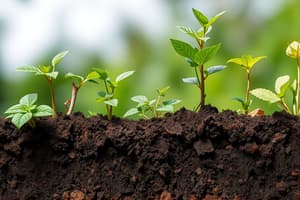Podcast
Questions and Answers
What is the primary function of a tensiometer?
What is the primary function of a tensiometer?
- To measure soil pH levels
- To assess soil temperature
- To analyze soil nutrient content
- To record soil moisture tension (correct)
Which component is NOT part of a tensiometer's construction?
Which component is NOT part of a tensiometer's construction?
- Hollow metallic tube
- Ceramic or clay cup
- Capacitance sensor (correct)
- Vacuum gauge
When should a soil be irrigated according to the tensiometer readings?
When should a soil be irrigated according to the tensiometer readings?
- When the soil is saturated
- When the soil reaches field capacity
- When the vacuum exceeds 1 atm
- When desired tension is reached (correct)
What is a limitation of using a tensiometer in certain soil types?
What is a limitation of using a tensiometer in certain soil types?
For which type of soil are tensiometers least effective?
For which type of soil are tensiometers least effective?
What is the primary purpose of the gravimetric method in soil moisture measurement?
What is the primary purpose of the gravimetric method in soil moisture measurement?
Which of the following limitations is associated with the volumetric method of measuring soil moisture?
Which of the following limitations is associated with the volumetric method of measuring soil moisture?
At what tension do plaster of Paris blocks function most efficiently?
At what tension do plaster of Paris blocks function most efficiently?
What is a critical consideration when placing gypsum blocks in soil?
What is a critical consideration when placing gypsum blocks in soil?
Why are nylon and fiberglass resistance blocks not suitable for use in saline conditions?
Why are nylon and fiberglass resistance blocks not suitable for use in saline conditions?
What term describes the attraction between soil particle surfaces and water?
What term describes the attraction between soil particle surfaces and water?
Which pore size is categorized as macropores?
Which pore size is categorized as macropores?
Which type of soil water is NOT available to plants?
Which type of soil water is NOT available to plants?
What is the primary method used to measure moisture content directly in the soil?
What is the primary method used to measure moisture content directly in the soil?
Which type of water moves freely downward in the soil due to gravity?
Which type of water moves freely downward in the soil due to gravity?
What is the tension range at which capillary water is held in soil?
What is the tension range at which capillary water is held in soil?
Which of the following is an indirect method of measuring soil moisture?
Which of the following is an indirect method of measuring soil moisture?
What effect do large pores have on soil properties?
What effect do large pores have on soil properties?
What is the primary purpose of the pressure membrane apparatus?
What is the primary purpose of the pressure membrane apparatus?
Which method is used for a practical estimate of moisture content based on touch?
Which method is used for a practical estimate of moisture content based on touch?
What is the first step in the gravimetric method for determining moisture content?
What is the first step in the gravimetric method for determining moisture content?
How is water content calculated in the gravimetric method?
How is water content calculated in the gravimetric method?
Which method is classified under the direct measurement of discharge?
Which method is classified under the direct measurement of discharge?
What coefficient is applied to the surface velocity to determine the mean velocity of flow in open channels?
What coefficient is applied to the surface velocity to determine the mean velocity of flow in open channels?
What equipment is necessary for performing the oven-drying method in determining soil moisture content?
What equipment is necessary for performing the oven-drying method in determining soil moisture content?
Which method is NOT associated with measuring the flow in pipes?
Which method is NOT associated with measuring the flow in pipes?
What was the estimated net irrigated area in India in 2015-16?
What was the estimated net irrigated area in India in 2015-16?
Which state had the highest groundwater potential among the listed states in 2015-16?
Which state had the highest groundwater potential among the listed states in 2015-16?
How much average annual precipitation does India receive?
How much average annual precipitation does India receive?
What percentage of water resources in India is considered utilizable?
What percentage of water resources in India is considered utilizable?
Which state reported a groundwater resource availability of 4233 km3/year for the years 2013-14 to 2015-16?
Which state reported a groundwater resource availability of 4233 km3/year for the years 2013-14 to 2015-16?
What was the average annual surface flow reported?
What was the average annual surface flow reported?
Which method is NOT mentioned as a way to enhance water resources potential?
Which method is NOT mentioned as a way to enhance water resources potential?
What was the groundwater share available for irrigation?
What was the groundwater share available for irrigation?
In which state was the groundwater resource measured to be 13 km3 in the year 2015-16?
In which state was the groundwater resource measured to be 13 km3 in the year 2015-16?
Which of the following states showed a decrease in groundwater availability from 2014-15 to 2015-16?
Which of the following states showed a decrease in groundwater availability from 2014-15 to 2015-16?
Which option correctly lists the net irrigated area percentages?
Which option correctly lists the net irrigated area percentages?
What is the total net groundwater resource in the listed years for India?
What is the total net groundwater resource in the listed years for India?
In the state of Bihar, what was the groundwater resource availability in 2013-14?
In the state of Bihar, what was the groundwater resource availability in 2013-14?
Flashcards are hidden until you start studying
Study Notes
Soil Matrix
- The solid phase of soil, known as the soil matrix, governs the distribution of liquid and gas phases.
- Interaction between the soil matrix and water is influenced by adhesion (attraction of soil particles to water) and cohesion (attraction of water molecules to each other).
- Adhesion occurs due to surface tension, while water is held tightly at the soil-water interface.
Pore Size Distribution
- Micropores: Smaller than 30 µm.
- Mesopores: Ranging from 30 to 100 µm.
- Macropores: Larger than 100 µm.
- Large pores enhance aeration and infiltration; medium pores facilitate capillary conductivity; small pores increase water holding capacity.
Soil Water Forms
- Gravitational water: Moves freely downward under gravity; also known as free water.
- Capillary water: Held in capillary spaces between tensions of about 31 atm and 1/3 atm; available for plant use.
- Hygroscopic water: Bound to soil particles by adsorptive forces; not available for plants, held at tensions greater than 31 atm.
Methods of Soil Moisture Measurement
- Direct Methods: Measure moisture content directly.
- Gravimetric method: Weighs soil samples, dried at 105°C.
- Volumetric method: Uses core samplers; accurate but labor-intensive.
- Indirect Methods: Measure water potential or tension.
- Tensiometers, resistance blocks, neutron probes, and pressure plate apparatus.
State-Wise Ground Water Resources (2013-16)
- Andhra Pradesh: 3014 - 2743 km³, trend downwards.
- Gujarat: Holds steady at 4233 km³.
- Uttar Pradesh: Highest availability, ranging from 14027 - 14231 km³.
- Overall ground water resources in India: 68117 - 67300 km³ over three years.
India's Water Resources Overview
- Total net sown area: 141 million ha; rainfed area: 86 million ha; irrigation potential: 140 million ha.
- Average annual precipitation: 4000 km³; average annual surface flow: 1869 km³.
- Groundwater resources available for irrigation: 361 km³; net utilizable: 325 km³.
- Water conservation methods include watershed management, rainwater harvesting, and pollution prevention.
Soil Moisture Measurement Techniques
-
Gravimetric Method:
- Weigh dried soil to determine moisture content.
- Comparison of moist sample and dry sample weights gives moisture percentage.
-
Volumetric Method:
- Uses known volume of soil; calculates water content through drying.
-
Resistance Blocks:
- Different types sensitive at varying tensions; gypsum blocks are suited for saline conditions.
-
Tensiometer:
- Direct measurement of soil moisture tension; effectively used in sandy soils.
Soil Moisture Characteristics
- Tension levels vary based on soil type: sandy (0.06 atm), loamy sand (0.3 atm), clay (0.6 atm).
Water Measurement Techniques in Irrigation Engineering
- Hydrometry encompasses methods such as the velocity-area method, direct discharge measurement using weirs, notches, and flumes.
- Float method applies a coefficient to surface velocity for flow calculations.
Studying That Suits You
Use AI to generate personalized quizzes and flashcards to suit your learning preferences.




